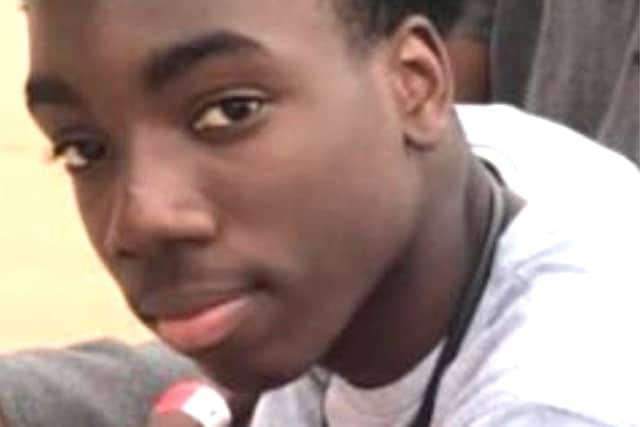Richard Okorogheye: Mother of teenager found dead in lake rejects Met Police apology after IOPC criticism
and live on Freeview channel 276
The mother of Richard Okorogheye, a 19-year-old black boy, whose body was found in a lake in Epping Forest, has rejected an apology from the Met Police.
The teenager was first reported missing on March 23, 2021, and his body was recovered from a lake in Epping Forest nearly a fortnight later, on April 5.
Advertisement
Hide AdAdvertisement
Hide AdA watchdog found the force should apologise to Evidence Joel, Mr Okorogheye’s mother, over its handling of initial reports that he was missing, and six staff should undergo training.


In a statement, Ms Joel said: “The IOPC investigation has confirmed what I always knew – in the darkest period of my life, I was dismissed by multiple Metropolitan Police staff at all levels of seniority and my son’s disappearance was not taken seriously.
“It is a matter of deep regret to me that despite both the IOPC and Metropolitan Police concluding that the performance of three police officers (including an Inspector) and three call handers fell short of the standard expected, nobody will face misconduct proceedings.
“Therefore the apology is not accepted.”
And Tara Mulcair of Birnberg Peirce solicitors, who is representing Ms Joel, said: “It is regrettable that the Metropolitan Police have decided to apologise to Ms Joel now, almost 16 months after his disappearance and only after a recommendation from the IOPC.”
Advertisement
Hide AdAdvertisement
Hide AdShe complained about how the Met treated her during phone calls, including racism, and being told words to the effect of: “If you can’t find your son, how do you expect us to?”
Police failed to correctly record her son’s medical condition after they were told he had sickle cell anaemia, the report found, while other information was not passed on quickly enough.
The Independent Office for Police Conduct (IOPC) found three police officers and three call handlers had not performed according to the standards expected.
An “unacceptable level of service” was provided to Ms Joel, a report found.
Advertisement
Hide AdAdvertisement
Hide AdAll six Met staff will undergo additional training but not face disciplinary action.
None has a case to answer for misconduct.
The investigation found:
- Richard should have been classed as a missing person and as high risk sooner;
- A call handler wrongly stated he had anaemia rather than sickle cell anaemia;
- Two call handlers failed update this as they thought there was no risk difference;
- An inspector did not record and explain why he was not an immediate health risk;
- A constable failed to add Richard’s GP’s concerns to the missing person’s report.
IOPC regional director Sal Naseem said: “We have shared our findings with Richard’s family and our thoughts are with them and all those affected by his tragic death.
“We found that call handlers did not record or pass on information as they should have done and may have given Ms Joel a false impression about how they were treating her son’s disappearance, which can only have increased her frustration and anguish.
“In our view, one officer did make a comment which could be considered unprofessional, and which Ms Joel perceived as racist, at a time when she was clearly distressed.
Advertisement
Hide AdAdvertisement
Hide Ad“After carefully examining the evidence, we found the officer handled this call badly but could not conclude the inappropriate comment was influenced by any bias regarding Richard’s ethnicity.
“The evidence shows Ms Joel did have good reason to believe her concerns were not being taken seriously.
“She made multiple phone calls to police and concerns she raised about his condition were initially either mis-recorded or underestimated.
“This can only have heightened Ms Joel’s perception of prejudice, as sickle cell anaemia is particularly common in people with an African or Caribbean family background.”
Advertisement
Hide AdAdvertisement
Hide AdThe IOPC also considered whether any police action caused or contributed to Mr Okorogheye’s death.
But it is not releasing its findings in relation to that, as it will up to an inquest to determine.
Met Police deputy assistant commissioner Bas Javid said: "Our thoughts remain with Richard’s family and I would like to apologise for the distress caused by the substandard level of service, as highlighted by the IOPC.
"It is clear the service we provided in the days following Richard’s disappearance was not at a level the public would expect of us, which included Richard not being classified as a missing person; his risk not being upgraded sooner; the communications with his mother not being as informative and precise as they could have been and, regrettably, an insensitive and inappropriate comment made by one of our officers.
Advertisement
Hide AdAdvertisement
Hide Ad“We will address these issues directly with the officers and staff involved through additional enhanced training.”
He added: “We recognise how worrying it must be to not know where a loved one is, and we are challenging ourselves to do better at responding when someone does report a missing person.”
The force says it is working with the charity Missing People and introducing new ways to assess missing person reports.
